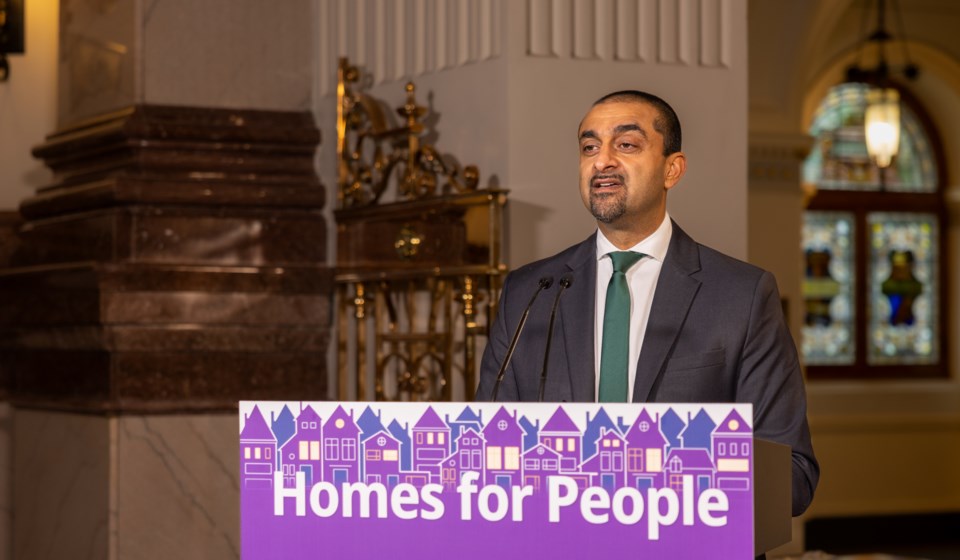The housing crisis has been chipping away at British Columbians for decades. But it appears 2023 might be the year officials from all levels of government have coalesced to ramp up initiatives aimed at tackling these persistent challenges.
Housing policy this past year has taken on a more systemic approach in addition to focusing more heavily on challenges such as low supply, slow approval processes and an insufficient provincial framework to build density, according to industry experts.
However, experts say issues remain when it comes to a lack of collaboration between local governments and the province, and more protection for renters and rental stock.
This year is also notably different due to this policy being created under the leadership of B.C.’s first dedicated minister of housing since the 1970s.
“We haven't seen this level of systems-wide thinking in previous years because housing has always been attached to another ministry,” said Marika Albert, policy director at the BC Non-Profit Housing Association.
An example of this system-wide approach is the Homes for People plan, a $4-billion investment over three years that also commits $12 billion over the next decade.
Under the umbrella of this plan is new legislation such as the transit-oriented development bill, a small-scale multi-unit housing bill, new short-term rental regulations, a design project that offers standardized housing plans, permitting improvement programs and incentives to build secondary suites.
This is addition to a Housing Supply Act that sets individual housing targets for B.C. municipalities, changes to the Strata Property Act and a Growing Communities Fund to increase infrastructure supports.
“We haven't seen this kind of fundamental change for decades. No other government has tackled it like this one is trying to,” said Anne McMullin, president and CEO of the non-profit Urban Development Institute.
“It changes how housing is delivered, and it gives municipalities the tools to actually accelerate the approval process and still allow for strong and robust community engagement rather than rezoning building by building.”
Total investment for B.C. housing initiatives rang in at $2.503 billion for the 2023-24 fiscal year and $3.142 billion for the 2022-23 fiscal year, including both capital and operating funding.
“If there was a magic switch that you can flip, that could solve the housing crisis, governments would have done it a long time ago. The truth is, it's going to require many policies, many levers and that's why we're doing so much, especially in the last six months, because all those levers need to be moving at the same time to address the challenge we have,” said Housing Minister Ravi Kahlon, who took on the role in December 2022.
Initiatives meant to address housing issues also include federal policies such as a GST waiver on new rental construction, and the Housing Accelerator Fund, a $4-billion initiative to help incentivize the construction of more homes.
On a local level, Vancouver city council has approved motions to allow the construction of multiple units on single-family properties and made efforts to speed up permitting.
When it comes to engagement with local governments, City of Coquitlam Coun. Trish Mandewo said there needs to be increased collaboration with municipalities.
“Our message to the province has been that we want to work with you. It signals the fact that the process has been very weak and very isolated, and local governments have not been brought to the table or consulted,” said Mandewo, who also serves as president of the Union of BC Municipalities.
Both Albert and McMullin said they would also like to see more collaboration between the ministries of housing and health, especially when it comes to supportive housing in the province.
“We have not done enough to house those who are the most vulnerable and with that must come health support,” said McMullin.
More work also needs to be done to protect renters and the supply of rental units in the province, said Robert Patterson, a lawyer at the Tenant Resource and Advisory Centre.
“There definitely could be more movement in guaranteeing people not just a home but a secure home and a safe home where they can feel that they can put down roots,” he said, adding that renter protections usually fall under the authority of local governments.
“The province has a great ability to, No. 1, set a baseline of that protection across the province, even if it's even just going to be in certain areas like around transit hubs. And No. 2, they have a much broader and bigger suite of power to enforce those rules.”




